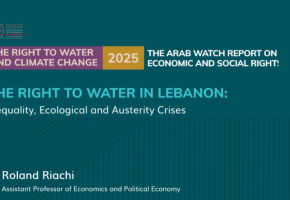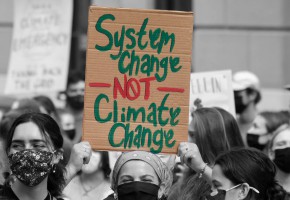
On a Warmer Planet: What Price Did the Arab Region Pay in 2024? - Judy al-Asmar
On a Warmer Planet: What Price Did the Arab Region Pay in 2024? - Judy al-Asmar
Consecutive climate summits have failed to stop the global warming counter as Earth heats up.
In its latest assessments in September 2024, the Copernicus Climate Change Service issued a report[1] warning the world about an unprecedented rise in the Earth's temperature, especially in the northern hemisphere. The preceding month of August had recorded an increase of 1.51 degrees Celsius compared to pre-industrial levels, and the conclusion was resounding: "Summer 2024 is the hottest on record."
Although not covered by the report, in 2024, the Arab region witnessed the harsh results of global warming. From flash floods to fires and severe drought, Sudan, Algeria, and Egypt are facing a crisis in climate adaptation, which has caused the extreme weather phenomena reviewed below.
Floods and Torrential Rain in Sudan: Weather Disasters During Conflict
In late August 2024, Sudan's news channels broadcast a scene of a group of Sudanese digging graves in muddy, saturated ground. The graves were not for victims of the two-year-long conflict but for the burial of 30 people who died in the collapse of the Arriaat Dam in Port Sudan. Earlier, the temporary administrative capital of the government had witnessed flash floods due to heavy rain.
A UN report[2] stated that 70 villages around the dam were impacted, and 20 were destroyed. The destruction affected the homes of 50,000 people. Moreover, 84 wells collapsed, 10,000 animals were lost, 70 schools were damaged or destroyed, and many residents were displaced to the mountains in harsh conditions.
Simultaneously, heavy rain fell in the far north of the country, and the states of Kassala and the Nile River were causing similar losses.[3]
Floods and stagnant water have led to some 2,900 suspected cases of cholera, and 124,000 people are at risk of famine in the capital of North Darfur. Heavy rains have submerged farmland and hampered the delivery of food aid.[4] The World Food Programme (WFP) has warned that "seasonal rains and floods add another layer of misery for hungry, displaced families."[5]
The war in Sudan has rendered official institutions incapable of organizing farmland during the summer rainy season, deepening the collapse of food security in a country plagued by famine and conflict.
While rain is a sign of livelihood for farming communities that make up most of Sudan, torrential rains accompanied by storms and extreme, unseasonable rains are repercussions of global warming.
It is worth noting that Sudan is classified among the least developed countries. It is affected by climate change, specifically global warming, but does not have an impact on it. Sudan is not an industrialized country. It has contributed the least to the climate change crisis but bears the heaviest burden.
Persistent Fires in Algeria
Despite recording the most significant decline in gas flaring globally in 2023, Algeria experienced a sweltering summer. In July 2024, temperatures ranged between 49.5 and 48.1 Celsius in the shade. Global weather monitoring centers classified Algeria as one of the hottest countries, specifically in six southern regions.
In the same month, 73 fires broke out in different states within 48 hours.[6] In August 2024, dozens of families had been evacuated from areas in the mountainous Kabylie region due to widespread fires that devoured olive trees.[7]
According to the "White Book on Climate Change Impact in Algeria,"[8] forests and trees cover less than 1 percent of the country's area. However, forest fires constitute one of the three major risks to lives, forests, and the Algerian economy. These tragedies have become a feature of Algeria's summer and reached their peak in the fires of Summer 2021, which claimed 69 lives, burned dozens of homes and olive groves, and led to the declaration of national mourning.
In 2022, heavy environmental losses were registered in 10,000 hectares of the El Kala region, which UNESCO classified as a reservoir of biological diversity.
Between 2010 and 2019, three thousand fires devoured an area equivalent to about 30,000 football fields. Annual losses in assets amounted to $11 million.[9]
Egyptian Agriculture Suffocating in the Heat
Egyptian farmers continue to suffer as the fertility of their lands deteriorates, which they attribute to the increasing Earth temperature and water scarcity.
In 2024, the village of Abu Danqash, located in Fayoum Governorate, lost "Egypt's most popular dish," Molokhia (Mallow), whose harvest season suffered due to drought. The village had been the crop's top exporter globally.[10]
Nonetheless, the damage was not limited to food heritage or the local economy. According to Bloomberg, "the rise in temperature in Egypt has become a bad omen for the world's economies."[11] The agency addressed Egypt's increasing dependence on imports to achieve self-sufficiency in raw materials, most notably liquefied natural gas, which the Egyptian government imported at rates that are the highest since 2018, to provide sufficient electricity to operate air conditioners, which in turn contributes to global warming.
According to the report, Egypt also increased its dependence on grain imports, especially wheat.
Climate Injustice
The global goal set by the Paris Climate Summit to limit the rise in global temperatures to 1.5 degrees above pre-industrial levels seems like a dream detached from bitter reality. While industrialized countries continue to produce greenhouse gases, pushing the planet towards the point of no return, Arab countries are paying the price for these climate bills.
The cruel irony is that the countries most affected are the least responsible for the climate crisis. Sudan and its floods, Algeria and its fires, and Egypt and its dry lands are mere examples of how climate change does not discriminate between countries. However, the weakest among them are certainly bearing the heaviest burden.
At the COP29 summit, there is an urgent need to radically re-evaluate the mechanism for distributing responsibilities. Industrialized countries must assume a serious responsibility, not only in reducing their emissions but also in providing financial and technical support to countries that pay the price of global warming with their lands, resources, and people's lives. If the gap between responsibility and dependency is not addressed, achieving climate justice will remain ink on paper while Arab countries burn and drown.
Judy al-Asmar
Reference
[1] "Copernicus Summer 2024: Hottest Record Globally and in Europe," Copernicus Climate Change Service, September 6, 2024, https://climate.copernicus.eu/copernicus-summer-2024-hottest-record-globally-and-europe.
[2] Vibhu Mishra, "Flooding from Sudan dam collapse worsens humanitarian crisis," UN News, 27/8/2024, https://news.un.org/en/story/2024/08/1153651.
[3] "في السودان، أمطار تهطل في غير موسمها تفاقم معاناة السكان"، بي بي سي عربي، 14 آب/أغسطس 2023، https://www.bbc.com/arabic/articles/ckg2zzrm2p5o.
[4] "السودان: الأمطار الغزيرة والفيضانات تفاقم الوضع الإنساني المتدهور بالفعل"، الأمم المتحدة، 9 أيلول/سبتمبر 2024، https://news.un.org/ar/story/2024/09/1134251.
[5] "السودان: الاستجابة الأممية لانعدام الأمن الغذائي تواجه تحديات النزاع والفيضانات"، الأمم المتحدة، 12 أيلول/سبتمبر 2024، https://news.un.org/ar/story/2024/09/1134426.
[6] "الجزائر تسجل 73 حريقاً في 48 ساعة"، الحرّة، 7 يوليو/تموز 2024، https://www.alhurra.com/algeria/2024/07/07/الجزائر-تسجل-73-حريقا-في-48-ساعة.
[7] "الجزائر تعلن السيطرة على حرائق أدت لإجلاء سكان من مناطق بشمال شرق البلاد"، فرانس 24، 11 آب/أغسطس 2024، https://www.france24.com/ar/%D8%A7%D9%84%D8%A3%D8%AE%D8%A8%D8%A7%D8%B1-%D8%A7%D9%84%D9%85%D8%BA%D8%A7%D8%B1%D8%A8%D9%8A%D8%A9/20240811-%D8%A7%D9%84%D8%B3%D9%84%D8%B7%D8%A7%D8%AA-%D8%A7%D9%84%D8%AC%D8%B2%D8%A7%D8%A6%D8%B1%D9%8A%D8%A9-%D8%AA%D8%AC%D9%84%D9%8A-%D8%B3%D9%83%D8%A7%D9%86%D8%A7-%D9%85%D9%86-%D9%85%D9%86%D8%A7%D8%B7%D9%82-%D8%A8%D8%B4%D9%85%D8%A7%D9%84-%D8%B4%D8%B1%D9%82-%D8%A7%D9%84%D8%A8%D9%84%D8%A7%D8%AF-%D8%A8%D8%B9%D8%AF-%D8%A7%D9%86%D8%AF%D9%84%D8%A7%D8%B9-%D8%AD%D8%B1%D8%A7%D8%A6%D9%82.
[8] "White book on climate change impact in Algeria comes out," Algeria Press Service, 21/9/2024, https://www.aps.dz/en/economy/38270-white-book-on-climate-change-impact-in-algeria-comes-out.
[9] Andrea Kutter, Karima Ben Bih, and Sandrine Jauffret, "Sustainable forest management will help Algeria tackle the risk of wildfires," World Bank Blogs, 18/11/2021, https://blogs.worldbank.org/en/arabvoices/sustainable-forest-management-will-help-algeria-tackle-risk-wildfires.
[10] مي الوزير، "التغير المناخي يهدد أشهر الأكلات المصرية (التفاصيل)"، المصري اليوم، 18 تموز/يوليو 2024، https://www.almasryalyoum.com/news/details/3216852.
[11] "Egypt's Early Heat Wave Is Ominous Warning for Economies, Trade," Bloomberg, June 12, 2024, https://www.bloomberg.com/news/features/2024-06-12/egypt-early-heat-wave-is-ominous-warning-for-economies-trade?embedded-checkout=true.
Recent publications

Neoliberalism and Feminist Discourse: Between Assimilation and Resistance in the Arab Context

The Right to Water in Lebanon: Inequality, Ecological and Austerity Crises - Roland Riachi
Related publications

An Alternative progressive cycle and a revitalized multilateral system - Roberto Bissio
